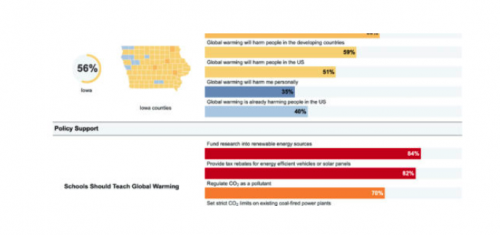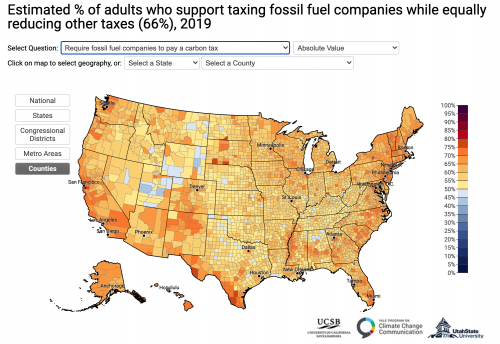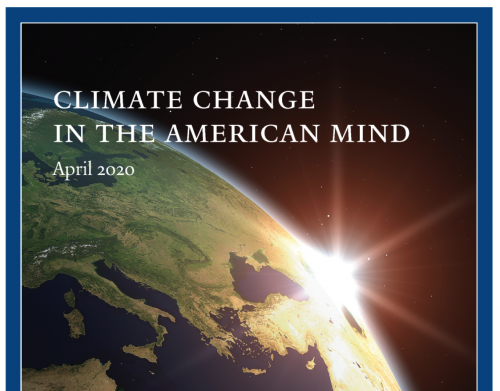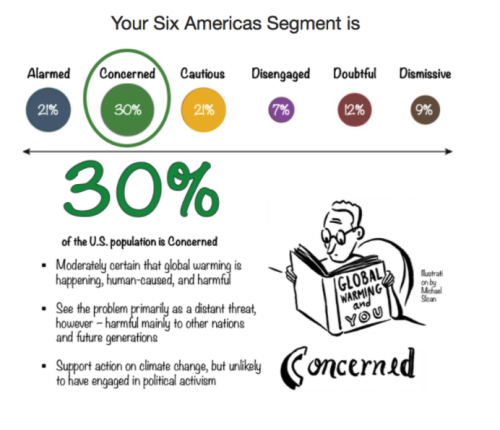Yale Climate Opinion Data
The Yale Project on Climate Change Communication (YPCCC) conducts scientific research on public climate change knowledge, attitudes, policy preferences, and behavior, and the underlying psychological, cultural, and political factors that influence them. Through this work they provide many helpful tools and visualizations for CCL volunteers to use in their climate advocacy.
Click the blue links for any of the topics listed below to be directed to an external Yale webpage where you can access the tool or visualization.
Climate Opinion Factsheets
 Climate Opinion Factsheets. Available in both English and Spanish. Drawing on the same data as the Yale Climate Opinion Maps and perfect for a meeting with a decision maker or editorial board, this "Factsheets" tool provides information about Americans' beliefs, risk perceptions, and policy preferences about climate change for all 50 states, 435 congressional districts, and 3,142 counties across the U.S. The tool allows you to customize which survey questions (of 22 key measures of public climate change knowledge, attitudes, policy support) are shown on your Factsheet. We hope you find the data and tool useful, and we welcome your feedback to help us improve future versions. To share and have printouts for your own meetings, use the Factsheet resource now to generate customized and updated information most helpful for your state or congressional district or county.
Climate Opinion Factsheets. Available in both English and Spanish. Drawing on the same data as the Yale Climate Opinion Maps and perfect for a meeting with a decision maker or editorial board, this "Factsheets" tool provides information about Americans' beliefs, risk perceptions, and policy preferences about climate change for all 50 states, 435 congressional districts, and 3,142 counties across the U.S. The tool allows you to customize which survey questions (of 22 key measures of public climate change knowledge, attitudes, policy support) are shown on your Factsheet. We hope you find the data and tool useful, and we welcome your feedback to help us improve future versions. To share and have printouts for your own meetings, use the Factsheet resource now to generate customized and updated information most helpful for your state or congressional district or county.
Yale Climate Opinion Maps
 Yale Climate Opinion Maps. Drawing on data collected during CCAM (see below), the Yale Climate Opinion Maps show how Americans’ climate change beliefs, risk perceptions, and policy support vary at the state, Congressional district, metro area and county levels. This link below provides a PDF for each Congressional District and State. Click on the link, scroll down to find your district/state, and then download to save the PDF to your computer.
Yale Climate Opinion Maps. Drawing on data collected during CCAM (see below), the Yale Climate Opinion Maps show how Americans’ climate change beliefs, risk perceptions, and policy support vary at the state, Congressional district, metro area and county levels. This link below provides a PDF for each Congressional District and State. Click on the link, scroll down to find your district/state, and then download to save the PDF to your computer.
CCL has compiled the results from Yale's polls into a single page printable graphic that we think can help you tell a compelling narrative regarding public support for climate action and specifically for the Energy Innovation and Carbon Dividend Act.
Climate Change in the American Mind
 Climate Change in the American Mind is a nationally representative survey conducted twice a year by YPCCC and the George Mason University Center for Climate Change Communication. CCAM measures, tracks, and explains Americans’ evolving climate change and clean energy beliefs, risk perceptions, policy support and behavior.
Climate Change in the American Mind is a nationally representative survey conducted twice a year by YPCCC and the George Mason University Center for Climate Change Communication. CCAM measures, tracks, and explains Americans’ evolving climate change and clean energy beliefs, risk perceptions, policy support and behavior.
CCAM Explorer
 The CCAM Explorer allows the public to explore Climate Change in the American Mind survey data for themselves. The tool allows visitors to analyze the diversity of Americans’ views on climate change. The dataset underlying the CCAM Explorer includes 19 waves of nationally representative surveys of U.S. adults aged 18 and older collected between 2008 and 2018.
The CCAM Explorer allows the public to explore Climate Change in the American Mind survey data for themselves. The tool allows visitors to analyze the diversity of Americans’ views on climate change. The dataset underlying the CCAM Explorer includes 19 waves of nationally representative surveys of U.S. adults aged 18 and older collected between 2008 and 2018.
Six Americas Super Short Survey
 Six Americas Super Short Survey (SASSY) is an audience segmentation tool designed to help people better understand their own climate views as well as others. The original Six Americas questionnaire was based on 36 items but has now been reduced to just four questions. Uses include educators who want to compare their students’ views before and after a class, researchers conducting surveys or experiments with a particular population, or NGOs who want to better understand their own members.
Six Americas Super Short Survey (SASSY) is an audience segmentation tool designed to help people better understand their own climate views as well as others. The original Six Americas questionnaire was based on 36 items but has now been reduced to just four questions. Uses include educators who want to compare their students’ views before and after a class, researchers conducting surveys or experiments with a particular population, or NGOs who want to better understand their own members.
Yale Climate Connections
 Yale Climate Connections is a nonpartisan, multimedia service providing daily broadcast radio programming, podcasts, and original web-based reporting, commentary, and analysis on the issue of climate change. Through articles, radio stories, videos, and webinars YCC “connects the dots” between climate change and energy, extreme weather, public health, food and water, jobs and the economy, national security, the creative arts, and religious and moral values, among other themes.
Yale Climate Connections is a nonpartisan, multimedia service providing daily broadcast radio programming, podcasts, and original web-based reporting, commentary, and analysis on the issue of climate change. Through articles, radio stories, videos, and webinars YCC “connects the dots” between climate change and energy, extreme weather, public health, food and water, jobs and the economy, national security, the creative arts, and religious and moral values, among other themes.
Yale Climate Connections website and broadcast editorial content is licensed under a Creative Commons Attribution-NoDerivatives 4.0 International License. Most of the material accordingly can be copied and redistributed in any medium or format so long as appropriate credit and link are provided and changes or modifications are noted. The material may not be remixed, transformed or built upon without prior written permission (merely changing the format does not constitute a derivative). For questions about fair use, contact the editor.